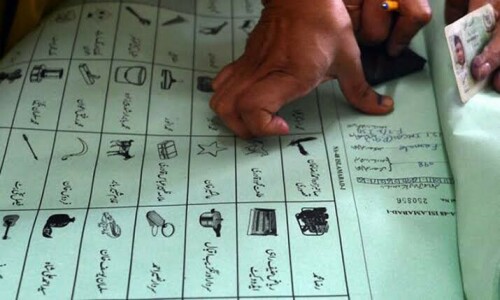WASHINGTON, Aug 10: The United States does not want to interfere in the impeachment process but should President Pervez Musharraf agree to step down, the Americans would like to ensure a secure and honourable stay for him in Pakistan.
Diplomatic and US official sources, when contacted by Dawn, said that US Ambassador Anne Patterson had left for Islamabad on Saturday after consulting senior White House and State Department officials on this issue.
She came to Washington in the last week of July to be present here during Prime Minister Yousuf Raza Gilani’s visit to the US capital but stayed back for further consultations on the ruling coalition’s decision to impeach President Musharraf.Although the coalition announced the impeachment move after the prime minister had returned to Islamabad, diplomatic sources in Washington say that the Gilani government had consulted both the Americans and the army before making the move.
According to these sources, the Americans told the Pakistanis that they want to stay neutral on this issue and would support any move which was “consistent with the rule of law and the Constitution,” as the State Department spokesman Gonzalo R. Gallegos said at a recent briefing.
The cleverly crafted statement maintains America’s neutrality because while the Constitution allows impeachment, it also permits the president to undo the current political set-up.
The Americans further emphasised their neutrality when approached by the Pakistani government to use its influence to persuade President Musharraf to step down.
The Pakistani government wanted a senior US official or a lawmaker to call President Musharraf and urge him to quit.
They reminded the Americans that they had used a similar approach against Philippines dictator Ferdinand Marcos in 1986 when senior US officials and lawmakers publicly urged him to step down.
But diplomatic sources say that the Americans are refusing to make any public statement for or against President Musharraf and instead want Pakistani politicians to tackle this issue without outside support.
They, however, appear willing to use their influence to arrange for a secure and honourable stay for President Musharraf in Pakistan should he agree to quit, the sources said.
A British media report -- re-published in American newspapers -- claims that President Musharraf is seriously considering a proposal to step down.
US officials, when contacted by Dawn, refused to confirm or deny this report but other sources said that “President Musharraf has made it clear that he has no plans to leave Pakistan, whether he stays in power or not.”
And, according to diplomatic sources, this is where the Americans are willing to help.
“They have apparently agreed to help assure a secure and honourable stay for him in Pakistan,” said one such source. “They also want to ensure that the president should be given full indemnity should he agree to step down.”
The source added: “This is more or less what the Pakistan army also wants.”
Meanwhile, senior Pakistani diplomats are scheduled to hold further talks with US officials on the issue on Monday when President George W. Bush returns to Washington after a week-long tour of several Asian countries.
Diplomatic sources say that the Pakistani government may directly appeal to President Bush to help defuse the current political crisis.
The Americans also fear that a power struggle between pro-and anti-Musharraf forces could push nuclear-armed Pakistan into a protracted turmoil; prevent its shaky civilian government from moving against militants hiding in Fata; and even jeopardise vital US supply lines through Pakistan to Afghanistan.
“There are elements within the US administration who would be very nervous about Musharraf leaving the scene, as they think the civilians are not in control of the army and ISI,” says Lisa Curtis, a senior research fellow at the Heritage Foundation in Washington.
But it is also apparent that the Americans are not willing to take any public position on this issue. At least not yet.














































Dear visitor, the comments section is undergoing an overhaul and will return soon.